
Grand Prix motorcycle racing is the premier class of motorcycle road racing events held on road circuits sanctioned by the Fédération Internationale de Motocyclisme (FIM). Independent motorcycle racing events have been held since the start of the twentieth century and large national events were often given the title Grand Prix. The foundation of the Fédération Internationale de Motocyclisme as the international governing body for motorcycle sport in 1949 provided the opportunity to coordinate rules and regulations in order that selected events could count towards official World Championships. It is the oldest established motorsport world championship.

AMA Superbike Championship is an American motorcycle racing series that has been run every year beginning in 1976. For most of its existence it has been considered the premier motorcycle road racing series in the United States. It is sanctioned by the AMA American Motorcyclist Association since its inception, and the promotion of the series has been licensed to several organizations over the years. Since 2015 the series has been run and promoted by MotoAmerica, who also manage several other AMA professional road racing championships, including the popular 600cc Supersport class.
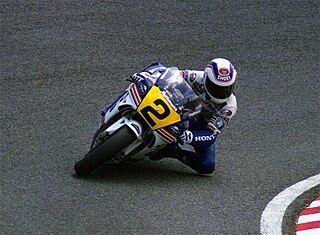
Wayne Michael Gardner is an Australian former professional Grand Prix motorcycle and touring car racer. His most notable achievement was winning the 1987 500 cc Motorcycle World Championship, becoming the first Australian to win motorcycling's premier class. His success on the world motorcycle road racing circuit earned him the nickname The Wollongong Whiz. Both of Gardner's sons, Remy and Luca, are motorcycle racers.

A sport bike is a motorcycle designed and optimized for speed, acceleration, braking, and cornering on asphalt concrete race tracks and roads. They are mainly designed for performance at the expense of comfort, fuel economy, and storage in comparison with other motorcycles.

Eddie Lawson is an American former four-time Grand Prix motorcycle racing World Champion. His record of not crashing and consistently finishing in the points earned him the nickname "Steady Eddie".
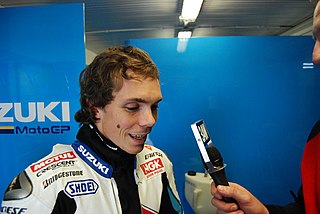
Chris Vermeulen is a retired Australian motorcycle racer who last competed in the World Superbike Championship for the works Kawasaki team, perhaps best-known for winning the 2007 French Grand Prix in MotoGP.
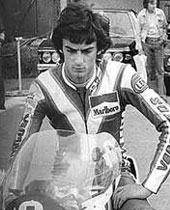
Franco Uncini is an Italian former professional Grand Prix motorcycle road racing. He was 1982 FIM Road Racing World Champion with Suzuki. He was inducted into the F.I.M. MotoGP Hall of Fame in 2016.

Gresini Racing is a motorcycle racing team competing in the MotoGP World Championship under the name Gresini Racing MotoGP as a Ducati satellite team, in the Moto2 World Championship as Team Gresini Moto2, and the MotoE World Cup as Felo Gresini Team. The team also competes in CIV Moto3.

Makoto Tamada (玉田誠) is a former Japanese professional motorcycle racer currently working as a rider instructor in Suzuka Racing School. He is one of the few riders to win races in both MotoGP and Superbike World Championship.
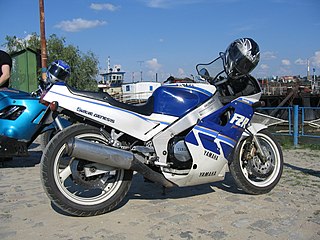
The Yamaha FZR1000 is a motorcycle produced by Yamaha from 1987 to 1995. Classed as a sports motorcycle.

The 1979 Grand Prix motorcycle racing season was the 31st F.I.M. Road Racing World Championship season.
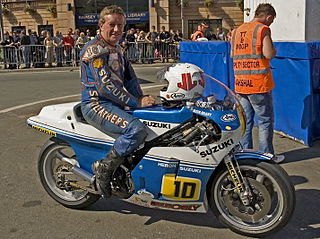
Mick Grant is an English former professional motorcycle road racer and TT rider. A works-supported rider for Norton, Kawasaki, Honda and Suzuki, he is a seven-time winner of the Isle of Man TT motorcycle race on various makes, including 'Slippery Sam', a three-cylinder Triumph Trident. The son of a coal miner, the soft-spoken, down-to-earth Yorkshireman from Wakefield, was a sharp contrast to the brash, playboy image presented by Londoner Barry Sheene during the 1970s.
Yvon Duhamel was a French Canadian professional motorcycle and snowmobile racer. A six-time winner of the White Trophy, the highest award in Canadian motorcycle racing, he was one of the most accomplished motorcycle racers in Canadian motorsports history. Duhamel was a versatile rider competing in numerous motorcycle racing disciplines including; trials, motocross, ice racing, drag racing, flat track racing and most prominently in road racing as a member of the Kawasaki factory racing team. His motorcycle racing career spanned the transition from the 60 horsepower four-stroke motorcycles of the 1960s, to the 100 horsepower two-stroke motorcycles of the 1970s. Even when Duhamel's motorcycle had a top speed advantage, he never slowed to conserve his machine, which led to spectacular crashes or mechanical failures as often as it led to race victories. Duhamel's reputation as a tenacious competitor with an aggressive riding style earned him the respect of other racers and made him popular with racing fans.
The 2002 Grand Prix motorcycle racing season was the 54th Fédération Internationale de Motocyclisme (FIM) Road Racing World Championship season. The season consist of 16 races, which started with the Japanese Grand Prix on 7 April and ended with the Valencian Community Grand Prix on 3 November.
Graeme Crosby is a former professional Grand Prix motorcycle road racer from New Zealand. A versatile rider, Crosby was equally capable on either four stroke Superbike racers or two stroke Grand Prix racers. He is the only person to have won the Daytona 200, the Imola 200, the Suzuka 8 Hours endurance race, and the Isle of Man TT.
The Sabre V4 was a 500 cc two-stroke motorcycle that competed in the 2001 500 cc World Championship. It utilised a Yamaha YZR500 engine which was housed in a custom made frame.
Superbike World Championship is a silhouette-class road racing series based on heavily modified production motorcycles, also known as superbike racing.
The 2009 Isle of Man TT Festival was held between Saturday 30 May and Friday 12 June on the 37.733-mile (60.725 km) Mountain Course. The 2009 TT races again include a second 600 cc Supersport Junior TT race and the Lightweight TT and Ultra-Lightweight TT races held on the 4.25-mile (6.84 km) Billown Circuit in the Isle of Man. A new event for the 2009 Isle of Man TT races was the one-lap TTXGP for racing motorcycles "to be powered without the use of carbon based fuels and have zero toxic/noxious emissions."

MotoAmerica is the organization that promotes the AMA Superbike Series since 2015. Sanctioned by the American Motorcyclist Association (AMA) and the Fédération Internationale de Motocyclisme (FIM), it features six classes of road racing: Superbike, Stock 1000, Supersport, Twins Cup, Junior Cup, and Mini Cup.
Grand Prix motorcycle racing sponsorship liveries have been used since the late 1960s, replacing the previously used national colours. With sponsors becoming more important with the rising costs in the motorcycle CC classes, many teams wanted to be able to display the logos of their sponsors as clearly as possible.













